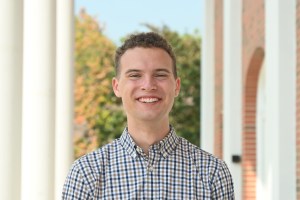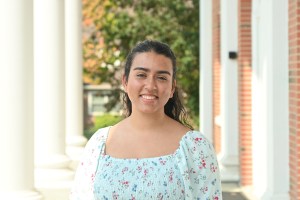Behind every Wheaton athletics team, there are five trainers who are working to make sure that athletes are healthy and ready to compete: Tricia Deter, head athletic trainer, full-time assistant trainers Allan Prasil and Jonathan Gramme and part-time assistant trainers Tonya Baker and Lance Mathieu. If an athlete goes down with an injury, this is the team getting them back on the court, field, track or pool.
The job description for athletic trainers boils down to protecting players’ health and rehabilitating them from injury. But it’s easier said than done. Each athlete requires different attention based on their injury history, the injury itself, the sport they play and a number of other factors. One session of rehab can take anywhere from 15 minutes to an hour and a half, depending on the injury and the athlete’s progression. Add it all up and 60 to 70 hour weeks are not uncommon for Wheaton’s trainers.
The hours may be long, but they build a strong connection between the training staff and Wheaton athletes. The training staff are some of the Thunder’s biggest fans.
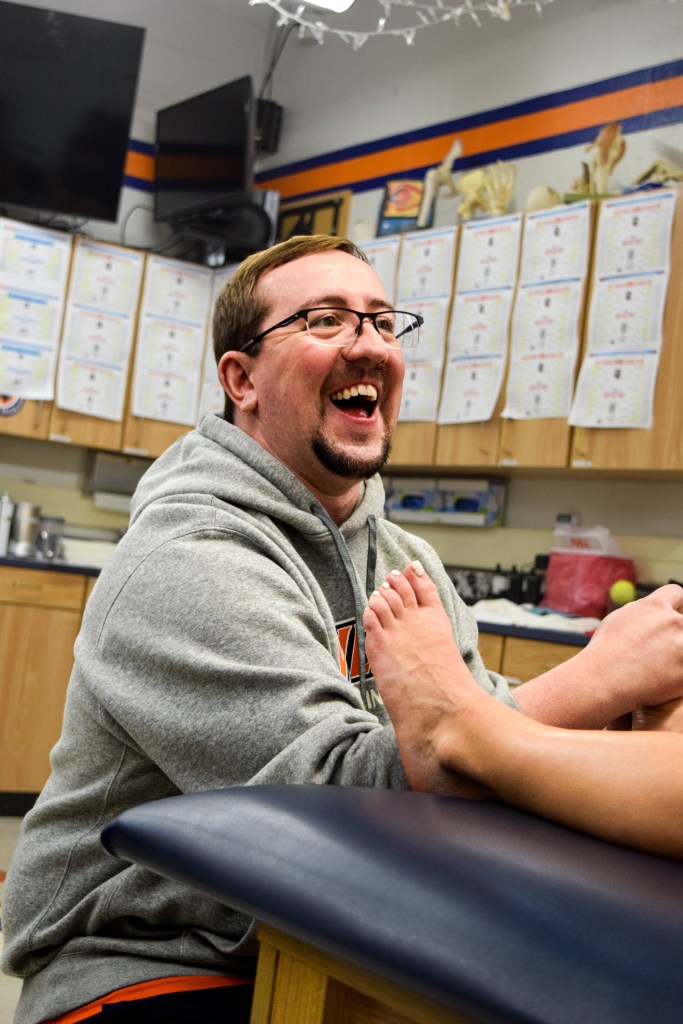
“When you spend six to seven days a week with the athletes, you start building relationships with them,” said Prasil, who has been a Wheaton trainer for 10 years. “When we win, I feel like I’m winning. When we’re losing, I feel like I’m losing because we are family.”
The personal journey that athletes undergo to come back from injury is just as meaningful. One of the hardest parts of the job, according to Deter, is watching the emotional and mental toll that injuries can take on athletes.
“It’s challenging to watch people go through hard things and feeling those emotions with them because that weighs heavy on us too,” said Deter.
The athletic training room, located on the north side of King Arena, is consistently filled with athletes completing their exercises – stretching, strength training, or receiving other physical therapy – and players catching up with trainers who helped them during their injury recoveries. The trainers help with pre- and post-game stretches, tape up athletes’ arms and legs and work through physical therapy exercises with athletes who are recovering from surgery.
To help athletes, the training room is filled with different forms of treatment, electric stimulation, ultrasound, hot and cold whirlpools and more. The athletic trainers are present for all the sports games that take place on campus, as well as for away games. To the trainers present at the game, they act as first responders for injured athletes to assess the injury, treat it with the resources available or determine if an ambulance is needed.
The trainers also attend games and competitions with the teams, ready to address any injuries that may occur during the competition. Each trainer is assigned a couple sports for the year, traveling with the team and preparing for injuries that are more likely to develop in that specific sport.
“We, of course, have a lot of equipment for emergency situations, but the goal is to hopefully never have to use them,” Mathieu said. Much of their focus is on being prepared.
Many of the injuries are sprains or muscle tears, which require reduced swelling and increased range of motion to make a full recovery. Ultimately, it is each trainer’s goal to get the athlete as pain-free as possible while recovering the mobility they lost in the injury.
The trainers acknowledge, however, that they are attending to more than an athlete’s physical injuries. They become an integral part of the athlete’s holistic recovery.
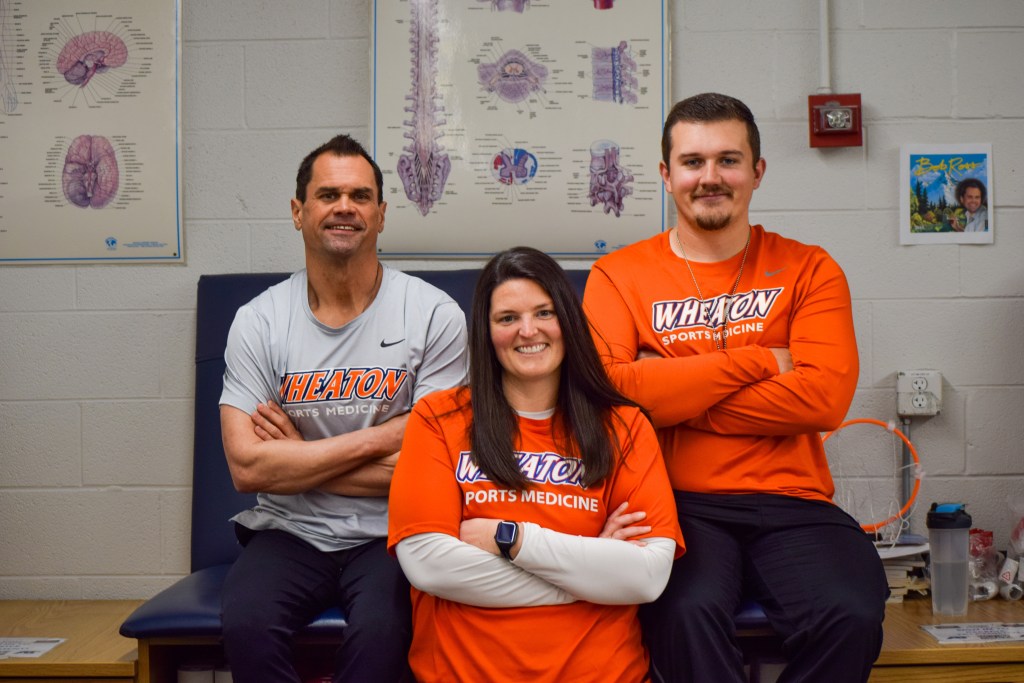
“I feel like I’m a substitute mom sometimes,” said Baker. “There are athletes coming from all over the country and I wanna be somebody that they feel comfortable going to if they have a problem. I want athletes to know that they have a home to come to when they want to get away from campus. I truly feel that I’ve established relationships with these athletes to where they feel like my own kids.”
When students are recovering from injury, it gives the trainers a chance to talk about faith. Gramme tries to help athletes keep a healthy perspective on their injury, reminding them that however serious the injury is, it’s something that the trainers are here to help them overcome.
“I feel like that helps in having hard conversations with people, just letting people who are going through an injury know that God doesn’t hate them,” said Gramme. “It’s a season of their life and they’re going to move forward through the storm.”
Prasil was 18 when he tore his ACL in a skiing accident. A football, basketball and track athlete in high school, his ACL injury kept him on the sidelines for the rest of his senior year. His time in the training room, however, made him consider physical therapy as a career for the first time. Since his days as a physical therapy student, he is pleased with how much more accessible the profession has become.
“At that time when I was in college, there weren’t a lot of schools that offered athletic trainer, athletic, athletic training as a major,” said Prasil. “Our profession has grown a lot since I was in college to now, which is me being 50. I can look back at seeing these younger kids graduating and seeing what our, how big, our profession has grown, which is great.”
According to the Commission on Accreditation of Physical Therapy Education, there were 259 institutions that offered a physical therapy education program in 2023. After growing up in Glen Elyn, Gramme studied at Aurora University. He completed his clinical training with an internship at Wheaton College and wanted to stay in the area and work with college athletes, ideally at a Christian school. Wheaton checked all the boxes.
“It worked out great,” said Gramme. “I’ve been here at Wheaton ever since I graduated. Just being able to come here and work has been awesome.”
Scores of athletes come through the training room every year and many make connections with the staff that endure after graduation. Just a few weeks ago, for instance, Baker’s daughter had a volleyball tournament in St. Louis where a 2012 Wheaton volleyball player lives. Who was in the crowd?
A 2012 Wheaton volleyball player who Baker helped rehab over 12 years ago.
“This is my way of having a big family. I have a lot of athletes that I still keep in touch with from years ago,” said Baker. “Being able to impact these kids and just be involved in their lives and to see them mature and grow up and then start having their own families is really neat.”
Prsasil said there is a sense of satisfaction when an athlete gets back on the field, often with a smile on their face.
“And when they come up to you and give you a big hug and tell you thank you, that’s special,” he said.
Deter, while challenged at times, is committed to walking alongside athletes.
“It is amazing the community we have with both coworkers and athletes. We get to know them as more than just an athlete. I count it a privilege to walk with them through very hard times. When they get injured, it’s not easy and it brings up a lot of emotions,” Deter said. “It’s just incredible watching what people are capable of, especially when they don’t think that they’re capable of it and then they accomplish it. And a lot of that comes in the rehab process.”
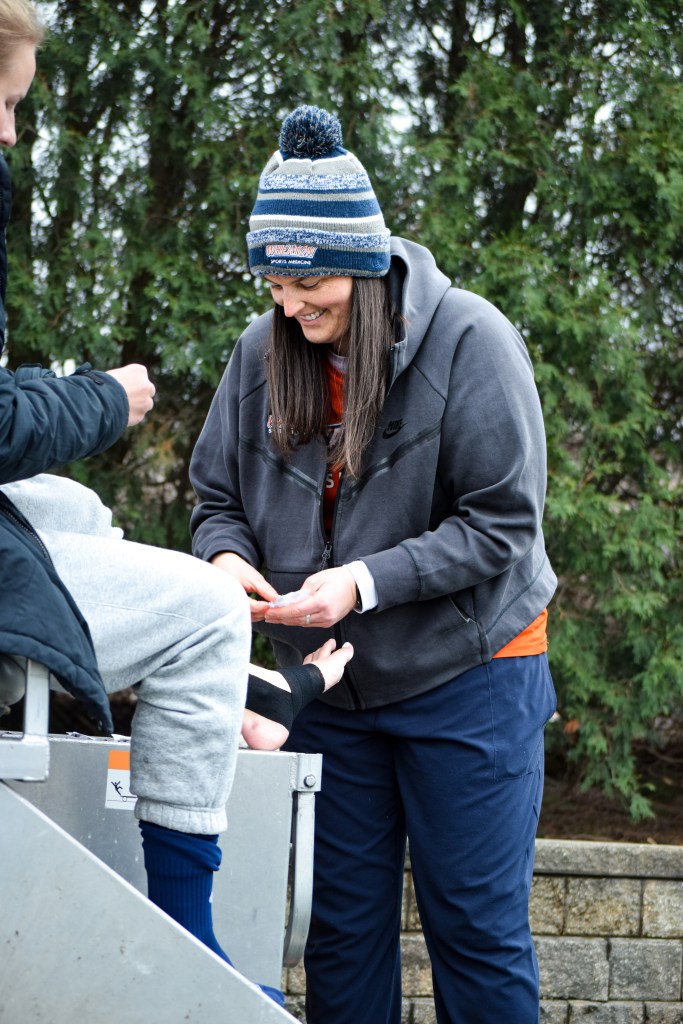
Freshman Elizabeth Clawson, a forward on the women’s soccer team, had surgery on her ankle over the summer and worked with Gramme 1-3 times a week to recover. Her time in the training room, she said, showed her just how much trainers care about their athletes and their work.
“Each one of them is incredibly knowledgeable and kind,” said Clawson, in an email to the Record. “They pour everything into getting to know us so that they can better help us succeed on and off the field. They grow us as athletes and people.”
Despite the setbacks that injuries cause, Wheaton trainers are doing their best to help athletes overcome and thrive as they recover.
“I love it here and don’t plan on leaving anytime soon,” said Gramme. “This is family to me.”

